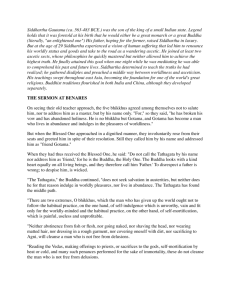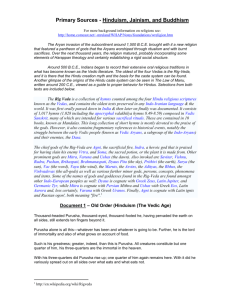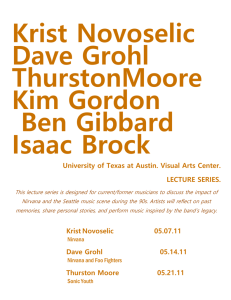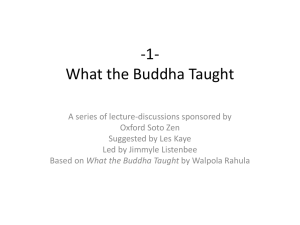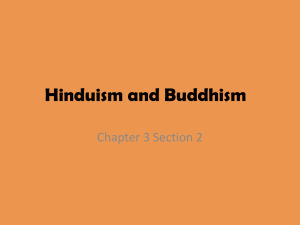The Buddha: Sermons and Teachings
advertisement
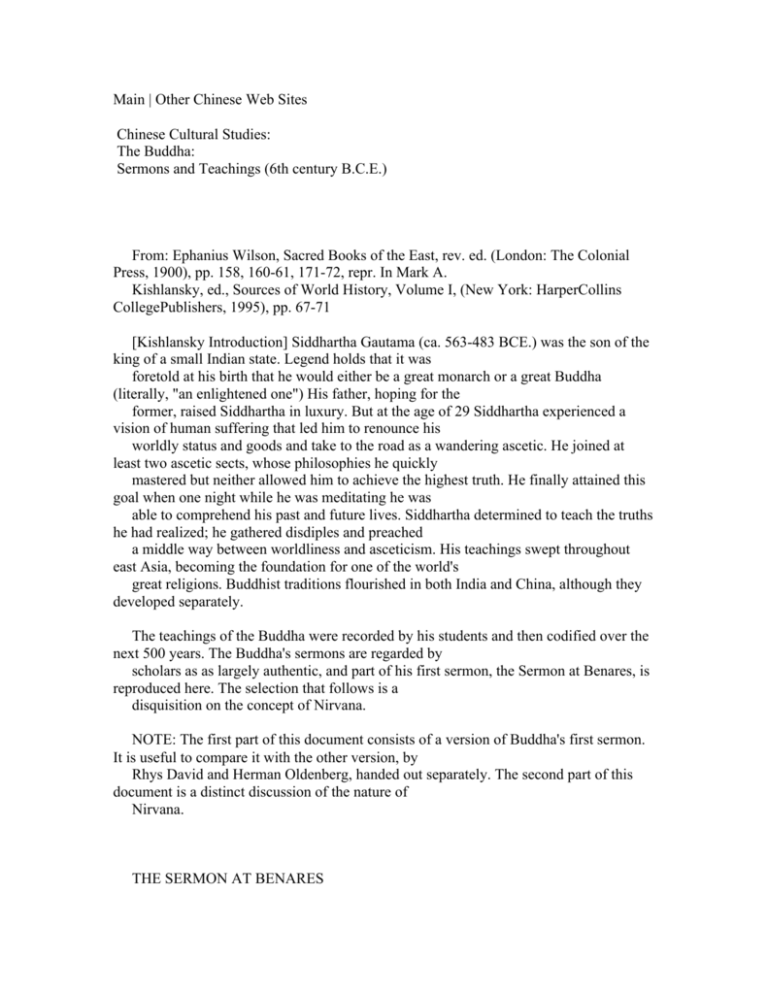
Main | Other Chinese Web Sites Chinese Cultural Studies: The Buddha: Sermons and Teachings (6th century B.C.E.) From: Ephanius Wilson, Sacred Books of the East, rev. ed. (London: The Colonial Press, 1900), pp. 158, 160-61, 171-72, repr. In Mark A. Kishlansky, ed., Sources of World History, Volume I, (New York: HarperCollins CollegePublishers, 1995), pp. 67-71 [Kishlansky Introduction] Siddhartha Gautama (ca. 563-483 BCE.) was the son of the king of a small Indian state. Legend holds that it was foretold at his birth that he would either be a great monarch or a great Buddha (literally, "an enlightened one") His father, hoping for the former, raised Siddhartha in luxury. But at the age of 29 Siddhartha experienced a vision of human suffering that led him to renounce his worldly status and goods and take to the road as a wandering ascetic. He joined at least two ascetic sects, whose philosophies he quickly mastered but neither allowed him to achieve the highest truth. He finally attained this goal when one night while he was meditating he was able to comprehend his past and future lives. Siddhartha determined to teach the truths he had realized; he gathered disdiples and preached a middle way between worldliness and asceticism. His teachings swept throughout east Asia, becoming the foundation for one of the world's great religions. Buddhist traditions flourished in both India and China, although they developed separately. The teachings of the Buddha were recorded by his students and then codified over the next 500 years. The Buddha's sermons are regarded by scholars as as largely authentic, and part of his first sermon, the Sermon at Benares, is reproduced here. The selection that follows is a disquisition on the concept of Nirvana. NOTE: The first part of this document consists of a version of Buddha's first sermon. It is useful to compare it with the other version, by Rhys David and Herman Oldenberg, handed out separately. The second part of this document is a distinct discussion of the nature of Nirvana. THE SERMON AT BENARES On seeing their old teacher approach, the five bhikkhus agreed among themselves not to salute him, nor to address him as a master, but by his name only. "For," so they said, "he has broken his vow and has abandoned holiness. He is no bhikkhu but Gotama, and Gotama has become a man who lives in abundance and indulges in the pleasures of worldliness." But when the Blessed One approached in a dignified manner, they involuntarily rose from their seats and greeted him in spite of their resolution. Still they called him by his name and addressed him as "friend Gotama." When they had thus received the Blessed One, he said: "Do not call the Tathagata by his name nor address him as 'friend,' for he is the Buddha, the Holy One. The Buddha looks with a kind heart equally on all living beings, and they therefore call him 'Father.' To disrespect a father is wrong; to despise him, is wicked. "The Tathagata," the Buddha continued, "does not seek salvation in austerities, but neither does he for that reason indulge in worldly pleasures, nor live in abundance. The Tathagata has found the middle path. "There are two extremes, O bhikkhus, which the man who has given up the world ought not to follow-the habitual practice, on the one hand, of self-indulgence which is unworthy, vain and fit only for the worldly-minded and the habitual practice, on the other hand, of self-mortification, which is painful, useless and unprofitable. "Neither abstinence from fish or flesh, nor going naked, nor shaving the head, nor wearing matted hair, nor dressing in a rough garment, nor covering oneself with dirt, nor sacrificing to Agni, will cleanse a man who is not free from delusions. "Reading the Vedas, making offerings to priests, or sacrifices to the gods, selfmortification by heat or cold, and many such penances performed for the sake of immortality, these do not cleanse the man who is not free from delusions. "Anger, drunkenness, obstinacy, bigotry, deception, envy, self-praise, disparaging others, superciliousness and evil intentions constitute uncleanness; not verily the eating of flesh. " A middle path, O bhikkhus, avoiding the two extremes, has been discovered by the Tathagata-a path which opens the eyes, and bestows understanding, which leads to peace of mind, to the higher wisdom, to full enlightenment, to Nirvana! "What is that middle path, O bhikkhus, avoiding these two extremes, discovered by the Tathagata - that path which opens the eyes, and bestows understanding, which leads to peace of mind, to the higher wisdom, to full enlightenment, to Nirvana? "Let me teach you, O bhikkhus, the middle path, which keeps aloof from both extremes. By suffering, the emaciated devotee produces confusion and sickly thoughts in his mind. Mortification is not conducive even to worldly knowledge; how much less to a triumph over the senses ! "He who fills his lamp with water will not dispel the darkness, and he who tries to light a fire with rotten wood will fail. And how can anyone be free from self by leading a wretched life, if he does not succeed in quenching the fires of lust, if he still hankers after either worldly or heavenly- pleasures. But he in whom self has become extinct is free from lust: he will desire neither worldly nor heavenly pleasures, and the satisfaction of his natural wants will not defile him. However, let him be moderate, let him eat and drink according to the needs of the body. "Sensuality is enervating: the "self-indulgent" man is a slave to pleasure to his passions, and pleasure-seek. ing is degrading and vulgar. "But to satisfy the necessities of life is not evil. To keep the body in good health is a duty for otherwise we shall not be able to trim the lamp of wisdom, and keep our mind strong and clear. Water surrounds the lotus-flower, but does not wet its petals. "This is the middle path, O bhikkhus. that keeps aloof from both extremes. And the Blessed One spoke kindly to his disciples, pitying them for their errors, and pointing out the uselessness of their endeavors, and the ice of ill-will that chilled their hearts melted away under the gentle warmth of the Master's persuasion. Now the Blessed One set the wheel of the most excellent law rolling, and he began to preach to the five bhikkhus, opening to them the gate of immortality, and showing them the bliss of Nirvana. The Buddha said: "The spokes of the wheel are the rules of pure conduct: justice is the uniformity of their length, wisdom is the tire; modesty and thoughtfulness are the hub in which the immovable axle of truth is fixed. "He who recognizes the existence of suffering, its cause, its remedy, and its cessation has fathomed the four noble truths. He will walk in the right path. "Right views will be the torch to light his way. Right aspirations will be his guide. Right speech will be his dwelling-place on the road. flis gait will be straight, for it is right behavior. His refreshments will be the right way of earning his livelihood. right efforts will be his steps right thoughts his breath; and right contemplation will give him the peace that follows in his footprints. "Now, this, O bhikkhus, is the noble truth concerning suffering: "Birth is attended with pain, decay is painful, disease is painful, death is painful. Union. with the unpleasant is painful, painful is separation from the pleasant, and any craving that is unsatisfied, that too is painful. In brief, bodily conditions which spring from attachment are painful. "This, then, O bhikkus, is the noble truth concerning suffering. "Now this, O bhikkhus, is the noble truth concerning the origin of suffering: "Verily, it is that craving which causes the renewal of existence, accompanied by sensual delight, seeking satisfaction now here, now there, the craving for the gratification of the passions, the craving for a future life, and the craving for happiness in this life. "This, then, O bhikkhus, is the noble truth concerning the origin of suffering"Now this, O bhikkhus, is the noble truth concerning the destruction of suffering: "Verily, it is the destruction, in which no passion remains, of this very thirst; it is the laying aside of, the being free from, the dwelling no longer upon this thirst. "This then, O bhikkhus, is the noble truth concerning the destruction of suffering'Now this, O bhikkhus, is the noble truth concerning the way which leads to the destruction of sorrow. Verily! it is this noble eightfold path: that is to say: "Right views; right aspirations; right speech; right behavior; right livelihood, right effort; right thoughts; and right contemplation. "This, then, O bhikkhus, is the noble truth concerning the destruction of sorrow. "By the practice of lovingkindness I have attained liberation of heart, and thus I am assured that I shall never return in renewed births. I have even now attained Nirvana." And when the Blessed One had thus set the royal chariot wheel of truth rolling onward, a rapture thrilled through all the universes. The devas left their heavenly abodes to listen to the sweetness of the truth; the saints that had parted from this life crowded around the great teacher to receive the glad tidings; even the animals of the earth felt the bliss that rested upon the words of the Tagathata: and all the creatures of the host of sentient beings, gods, men, and beasts, hearing the message of deliverance, received and understood it in their own language. And when the doctrine was propounded, the venerable Kondanna, the oldest one among the five bhikkhus, discerned the truth with his mental eye, and he said: "Truly, O Buddha, our Lord, thou hast found the truth!" Then the other bhikkhus too, joined him and exclaimed: "Truly, thou art the Buddha, thou has found the truth. " And the devas and saints and all the good spirits of the departed generations that had listened to the sermon of the Tathagata, joyfully received the doctrine and shouted: "Truly, the blessed One has founded the kingdom of righteousness. The Blessed One has moved the earth; he has set the wheel of Truth rolling, which by no one in the universe, be he god or man, can ever be turned back. The kingdom of Truth will be preached upon earth; it will spread; and righteousness, good-will, and peace will reign among mankind." WHAT IS NIRVANA? "Revered Nagasena, things produced of karma are seen in the world, things produced of cause are seen, things produced of nature are seen. Tell me what in the world is born not of karma, not of cause, not of nature." "These two, sire, in. the world are born not of karma, not of cause, not of nature. which two? Ether, sire, and Nirvana." "Do not, revered Nagasena, corrupt the Conqueror's words and answer the question ignorantly." "What did I say, sire, that you speak thus to me!" "Revered Nagasena, what you said about ether - that it is born not of karma nor of cause nor of nature-is right. But with many a hundred reasons did the Lord, revered Nagasena, point out to disciples the Way to the realization of Nirvana and then you speak thus: 'Nirvana is born of no cause."' "It is true, sire, that with many a hundred reasons did the Lord point out to disciples the Way to the realization of Nirvana; but he did not point out a cause for the production o f Nirvana." "Well then, sire, attend carefully, listen closely, and I will tell the reason as to this. Would a man, sire, with his natural strength be able to go from here up a high Himalayan mountain?" 'Yes, revered Nagasena." "But would that man, sire, with his natural strength be able to bring a high Himalayan mountain here. "Certainly not, revered sir." "Even so, sire, it is possible to point out the Way for the realization of Nirvana, but impossible to show a cause for the production of Nirvana. Would it be possible, sire, for a man who, with his natural strength, has crossed over the great sea in a boat to reach the farther shore!" "Yes, revered sir." "But would it be possible, sire, for that man, with his natural strength, to bring the farther shore of the great sea here?" "Certainly not, revered sir." "Even so, sire, it is possible to point out the Way to the realization of Nirvana, but impossible to show a cause for the production of Nirvana. For what reason? It is because of the uncompounded nature of the thing." "Revered Nagasena, is Nirvana uncompounded!" "Yes, sire, Nirvana is uncompounded; it is made by nothing at all. Sire, one cannot say of Nirvana that it arises or that it does not arise or that it is to be produced or that it is past or future or present, or that it is cognizable by the eye, ear, nose, tongue or body." "If, revered Nagasena, Nirvana neither arises nor does not arise and so on. as you say. well then, revered Nagasena, you indicate Nirvana as a thing that is not: Nirvana is not." "Sire, Nirvana is; Nirvana is cognizable by mind; an ariyan-disciple, faring along rightly with a mind that is purified, lofty, straight, without obstructions, without temporal desires, sees Nirvana." "But what, revered sir, is that Nirvana like that can be illustrated by similes! Convince me with reasons according to which a thing that is can be illustrated by similes." "Is there, sire, what is called wind?" "Yes, revered sir." "Please, sire, show the wind by its color or configuration or as thin or thick or long or short." "But it is not possible, revered Nagasena, for the wind to be shown; for the wind cannot be grasped in the hand or touched, but yet there is the wind." "If, sire, it is not possible for the wind to be shown, well then, there is no wind." "I, revered Nagasena, know that there is wind, I am convinced of it, but I am not able to show the wind." "Even so, sire, there is Nirvana; but it is not possible to show Nirvana by color or configuration." "Very good, revered Nagasena, well shown is the simile. well seen the reason: thus it is and I accept it as you say: There is Nirvana." [Kishlansky] Questions 1. What were some of the personal characteristics of the Buddha? 2. Why, when. the five bhikkhus in The Sermon at Benares saw the Buddha did they decide to ignore him? What made them change their minds? 3. In the Sermon at Benares, the Buddha laid out the basic tenets of his Buddhism. What are the four noble truths?. What is the worldview espoused by these beliefs? 4. According to the Buddha, what is Nirvana? What role does Nirvana play in Buddhism? 5. The Buddhist movement fostered participation at different levels. Many followers sought the "ordinary" norm; one of their duties was to Support those who sought the "extraordinary" norm and became monks and nuns. What effect would this dual community of believers have on their society?

